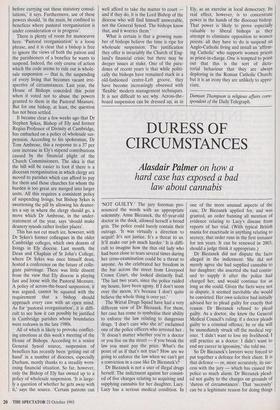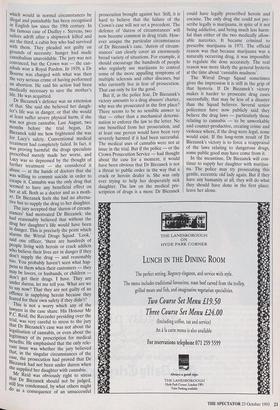DURESS OF CIRCUMSTANCES
Alasdair Palmer on how a
hard case has exposed a bad law about cannabis
`NOT GUILTY.' The jury foreman pro- nounced the words with an appropriate solemnity. Anne Biezanek, the 65-year-old doctor in the dock, allowed herself a broad grin. The police could barely contain their outrage. 'It was virtually a direction to acquit! It's not justice. It's a threat to us. It'll make our job much harder.' It is diffi- cult to imagine how the thin old lady who had been close to tears several times during her cross-examination could be a threat to anyone. As she celebrated her freedom in the bar across the street from Liverpool Crown Court, she looked distinctly frail. `The last two years, since the police raided my house, have been agony. If I don't seem over the moon, it's because I don't quite believe the whole thing is over yet.'
The Wirral Drugs Squad have had a very different view of Dr Biezanek. For them, her case has come to symbolise their ability to enforce the law relating to dangerous drugs. 'I don't care who she is!' exclaimed one of the police officers who arrested her . `It doesn't matter whether you're a doctor or you live on the street — if you break the law you must pay the price. What's the point of us if that's not true? How are we going to enforce the law when we can't get a conviction in a case like Dr Biezanek's?
Dr Biezanek is not a user of illegal drugs herself. The indictment against her consist- ed of five charges relating to acquiring and supplying cannabis for her daughter, Lucy. Lucy has a serious medical condition. In one of the more unusual aspects of the case, Dr Biezanek applied for, and was granted, an order banning all mention of evidence relating to Lucy's disease from reports of her trial. (With typical British mania for exactitude in anything relating to secrecy, that order runs in the first instance for ten years. It can be renewed in 2003. should a judge think it appropriate.) Dr Biezanek did not dispute the facts alleged in the indictment. She did not merely agree she had supplied cannabis to her daughter; she asserted she had contin- ued to supply it after the police had charged her, and would continue for as long as she could. Given the facts were not in dispute, it seemed inevitable she would be convicted. Her own solicitor had initially advised her to plead guilty for exactly that reason. Dr Biezanek refused to plead guilty. As a doctor, she knew the General Medical Council's ruling: if a doctor pleads guilty to a criminal offence, he or she will be immediately struck off the medical reg- ister. 'I didn't want to lose my livelihood. I still practice as a doctor. I didn't want to end my career in ignominy,' she told me.
So Dr Biezanek's lawyers were forced to put together a defence for their client. It is that defence — or, more accurately, its suc- cess with the jury — which has caused the police so much alarm. Dr Biezanek plead- ed not guilty to the charges on grounds of `duress of circumstances'. That 'necessity' can be a legitimate reason for doing things which would in normal circumstances be illegal and punishable has been recognised in English law since the 19th century. In the famous case of Dudley v. Stevens, two sailors adrift after a shipwreck killed and ate the third, a cabin boy who had survived with them. They pleaded not guilty on grounds of necessity: hunger had made cannibalism unavoidable. The jury was not convinced, but the Crown was — the can- nibals won a Royal Pardon. In 1939, a Dr Bourne was charged with what was then the very serious crime of having performed an abortion. He said his action had been medically necessary to save the mother's life. He was acquitted. Dr Biezanek's defence was an extension of that. She said she believed her daugh- ter's life was in danger, or that she would at least suffer severe physical harm, if she was not given cannabis. Last August, two months before the trial began, Dr Biezanek told me how frightened she was for Lucy's safety. Conventional medical treatment had completely failed. In fact, it was proving harmful: the drugs specialists prescribed merely made her worse, and Lucy was so depressed by the thought of further treatment — she considered it abuse — at the hands of doctors that she was willing to commit suicide in order to escape it Cannabis was the only drug that seemed to have any beneficial effect on her at all. Both as a doctor and as a moth- er, Dr Biezanek feels she had no alterna- tive but to supply the drug to her daughter.
The jury accepted that 'duress of circum- stances' had motivated Dr Biezanek: she had reasonably believed that without the drug her daughter's life would have been in danger. This is precisely the point which alarms the Wirral Drugs Squad. 'Look,' said one officer, 'there are hundreds of People living with heroin or crack addicts who believe their lives are in danger if they don't supply the drug — and reasonably too. You probably haven't seen what hap- Pens to them when their customers — they may be lovers, or husbands, or children don't get their drugs. I have. They are under duress, let me tell you. What are we to say now? That they are not guilty of an offence in supplying heroin because they feared for their own safety if they didn't? This is not a worry which any of the lawyers in the case share. His Honour Mr P.C. Reid, the Recorder presiding over the trial, was very careful to stress to the jury that Dr Biezanek's case was not about the legalisation of cannabis, or even about the legitimacy of its prescription for medical benefits. He emphasised that the only rele- vant issue was whether the jury believed that, in the singular circumstances of the Ease, the prosecution had proved that Dr Biezanek had not been under duress when she supplied her daughter with cannabis. Mr Reid was obviously right to stress that Dr Biezanek should not be judged, still less condemned, by what others might °I° as a consequence of an unsuccessful
prosecution brought against her. Still, it is hard to believe that the failure of the Crown's case will not set a precedent. The defence of 'duress of circumstances' will now become common in drug trials. How- ever unique the particular circumstances of Dr Biezanek's case, 'duress of circum- stances' can clearly cover an enormously broad variety of situations. For example, it should encourage the hundreds of people who regularly use marijuana to control some of the more appalling symptoms of multiple sclerosis and other diseases, but who currently live in fear of prosecution. That can only be for the good. But if, as the police fear, Dr Biezanek's victory amounts to a drug abusers' charter, why was she prosecuted in the first place? There seems to be no sensible answer to that — other than a mechanical determi- nation to enforce the law to the letter. No one benefited from her prosecution, and at least one person would have been very severely harmed if it had been successful. The medical uses of cannabis were not at issue in the trial. But if the police — or the Crown Prosecution Service — had thought about the case for a moment, it would have been obvious that Dr Biezanek is not a threat to public order in the way that a crack or heroin dealer is. She was only ever trying to help her desperately sick daughter. The law on the medical pre- scription of drugs is a mess: Dr Biezanek could have legally prescribed heroin and cocaine. The only drug she could not pre- scribe legally is marijuana, in spite of it not being addictive, and being much less harm- ful than either of the two medically allow- able narcotics. It became criminal to prescribe marijuana in 1971. The official reason was that because marijuana was a naturally occurring drug, it was impossible to regulate the dose accurately. The real reason was more likely the general hysteria at the time about 'cannabis madness'.
The Wirral Drugs Squad sometimes gives the impression it is still in the grip of that hysteria. If Dr Biezanek's victory makes it harder to prosecute drug cases successfully, that may be less of a disaster than the Squad believes. Several senior policemen have now publicly said they believe the drug laws — particularly those relating to cannabis — to be unworkable and counter-productive, creating crime and violence where, if the drug were legal, none would exist. If the long-term result of Dr Biezanek's victory is to force a reappraisal of the laws relating to dangerous drugs, some public good may have come from it.
In the meantime, Dr Biezanek will con- tinue to supply her daughter with marijua- na. The police may try prosecuting this gentle, eccentric old lady again. But if they have any humanity at all, they will do what they should have done in the first place: leave her alone.



































































 Previous page
Previous page